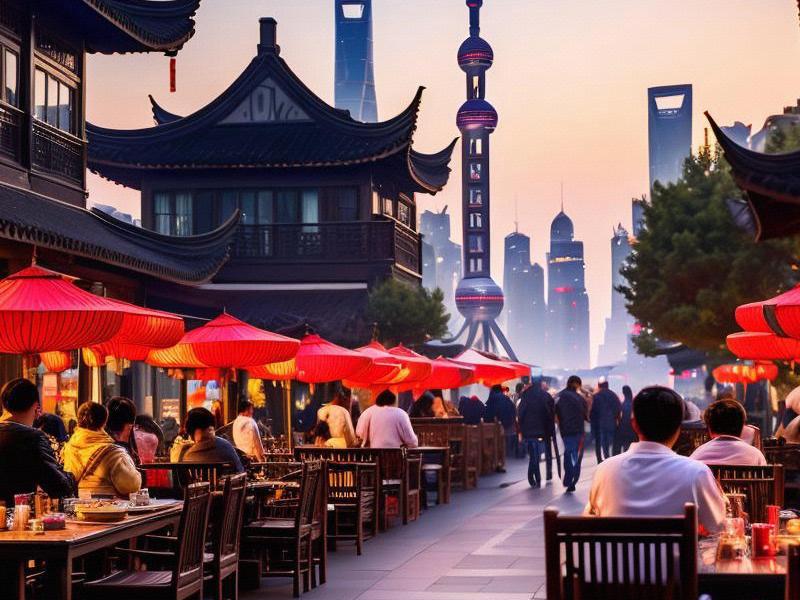
Nestled at the mouth of the Yangtze River, Shanghai has always been a hub of trade and cultural exchange. Its strategic location has made it a meeting point for merchants from all over China and beyond, each bringing their own culinary traditions. Over centuries, these influences have woven together to crteeaa distinctive restaurant culture that is both deeply rooted in tradition and constantly evolving with the times.
The history of Shanghai's restaurant culture can be traced back to the late Ming and early Qing dynasties. During this period, the city began to emerge as a commercial center, attracting traders and travelers from distant lands. These early establishments were primarily teahouses and small eateries, offering simple yet flavorful dishes. As Shanghai grew in prominence, so did its餐饮餐馆(restaurant)(restaurants) (restaurants). (Note: The term "restaurant" is translated to "餐馆" in Chinese, but left in English here to maintain the original text flow.)
In the late 19th and early 20th centuries, Shanghai became a concessions territory, ruled by foreign powers. This period saw an influx of Western cuisine, which was introduced by expatriates and integrated with local flavors. The result was a unique fusion of Eastern and Western culinary traditions, giving rise to iconic dishes such as the Shanghainese-style steak and the Shanghai-style pizza. These dishes, along with others like the famous Xiaolongbao (soup dumplings), have become synonymous with the city's culinary identity.
Today, Shanghai's restaurant scene is a vibrant tapestry of traditional and modern dining experiences. The city boasts a wide array of restaurants, from centuries-old establishments that have weathered the test of time to cutting-edge eateries that push the boundaries of culinary innovation.
上海龙凤千花1314 One of the most iconic aspects of Shanghai's restaurant culture is its deep appreciation for fresh, seasonal ingredients. This emphasis on quality is evident in the city's numerous farmers' markets, where locals gather to选购购买 (purchase) (buy) (Note: The term "purchase" is translated to "购买" in Chinese, but left in English here to maintain the original text flow.) the freshest produce, seafood, and meats. Many of these ingredients find their way into the kitchens of Shanghai's renowned restaurants, where they are transformed into exquisite dishes that celebrate the region's natural bounty.
The city's culinary diversity is further enriched by its many ethnic communities. Shanghai is home to a significant population of people from various parts of China, as well as international expatriates. This melting pot of cultures has given rise to a rich tapestry of cuisines, including Sichuan, Cantonese, Hunan, and beyond. Visitors can savor the bold, spicy flavors of Sichuan cuisine, the delicate sweetness of Cantonese dim sum, and the smoky, charred notes of Hunan dishes, all within the confines of this dynamic city.
In recent years, Shanghai has also emerged as a global hub for fine dining. Renowned chefs from around the world have set up shop in the city, bringing with them their unique culinary styles and techniques. These establishments offer a sophisticated dining experience that caters to the tastes of an international clientele. From Michelin-starred restaurants to trendy rooftop bars, Shanghai's fine dining scene is a testament to the city's growing reputation as a culinary capital.
However, amidst the glitz and glamour of fine dining, it is important to remember the heart and soul of Shanghai's restaurant culture lies in its humble, everyday eateries. These unassuming establishments, often tucked away in narrow alleys and bustling neighborhoods, are where the city's residents truly come together to share a meal and connect with one another.
上海龙凤419会所 One such example is the Shikumen neighborhood, a historic area characterized by its distinctive stone gateways and narrow lanes. Here, you'll find a myriad of small restaurants and eateries, each offering a unique taste of Shanghai's culinary heritage. From the savory aroma of braised pork belly to the comforting warmth of a bowl of wonton soup, these establishments provide a glimpse into the everyday lives of Shanghai's people.
Another hidden gem is the Yangpu District, a lesser-known area that is home to some of the city's best-kept secrets. Here, you'll discover a mix of traditional and modern eateries, each with its own unique charm. Whether you're craving a plate of stir-fried noodles or a slice of decadent cheesecake, you're sure to find something to satisfy your cravings.
In addition to its diverse range of restaurants, Shanghai is also known for its vibrant food festivals and events. These celebrations showcase the city's culinary traditions and bring together people from all walks of life to enjoy a feast of flavors. From the annual Dragon Boat Festival, where you can sample delicious zongzi (sticky rice dumplings), to the Shanghai Food Expo, which highlights the latest trends in the culinary world, these events offer a unique opportunity to immerse yourself in the city's rich food culture.
上海花千坊龙凤 As Shanghai continues to grow and evolve, so too does its restaurant culture. The city is constantly experimenting with new ingredients, techniques, and concepts, pushing the boundaries of what is possible in the culinary arts. This spirit of innovation is reflected in the many emerging chefs and restaurateurs who are redefining the city's dining scene.
At the same time, Shanghai remains deeply committed to preserving its culinary heritage. Efforts are being made to protect and promote traditional recipes, as well as to support local farmers and producers who play a vital role in the city's food ecosystem. By striking a balance between tradition and innovation, Shanghai is ensuring that its restaurant culture remains vibrant and relevant for generations to come.
In conclusion, Shanghai's restaurant culture is a testament to the city's rich history, diverse influences, and commitment to excellence. From its centuries-old teahouses to its cutting-edge fine dining establishments, the city offers a unique and unforgettable dining experience that reflects its dynamic spirit. Whether you're a food lover, a history buff, or simply someone looking to explore the city's vibrant neighborhoods, Shanghai's restaurant scene is sure to leave a lasting impression.
